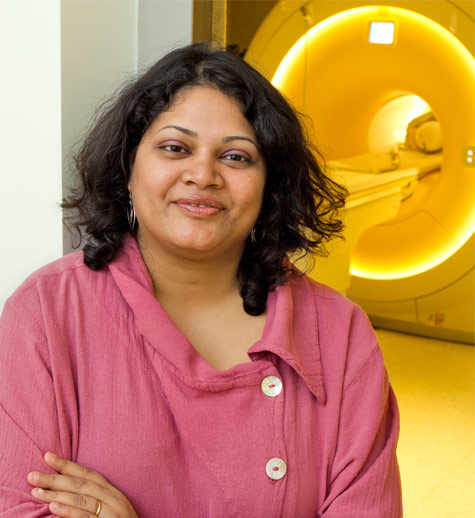
Dr. Denise Park (center, back row) and members of her lab at the Center for Vital Longevity were awarded a $1.2 million grant that will help them continue their work examining whether the rate at which brains age can be slowed.
Researchers at the Center for Vital Longevity at The University of Texas at Dallas recently received three federal grants totaling more than $5 million to start new projects or continue existing studies on the cognitive neuroscience of aging.
“These recent awards are a very welcome addition to the federal funding held by the center,” said Dr. Michael Rugg, Distinguished Chair in Behavioral and Brain Sciences and center director. “They will support important and urgently needed research and are a testimony to the talents of my colleagues and to the high quality of their research programs.”
Dr. Denise Park, Distinguished University Chair in Behavioral and Brain Sciences and director of research and the founder of the center, was awarded $1.2 million from the National Institute on Aging (NIA) for an ongoing project aimed at determining whether individuals can slow the rate at which their brains age. Park initiated the Synapse Project eight years ago with NIA funding.
As part of the original study, older adults were randomly assigned to mentally challenging conditions, including learning digital photography, quilting or both. Park and her team used written tests and MRI scans to measure participants’ cognitive and brain function before and after the tasks to learn whether cognitive stimulation, socialization or a combination of both changed or improved their functioning.
Results showed that memory improved after participants learned to take digital photographs, but further study is needed to determine how mentally challenging activities facilitate memory in cognitively normal adults through changes in neural structure and function.

Dr. Karen Rodrigue
With the infusion of $1.2 million from the NIA’s Alzheimer’s Disease Initiative, Park and her team will re-create similar conditions to the earlier project to see if they can replicate the original effect. If successful, they expect to begin a large clinical trial that tests whether sustained engagement delays normal and pathological cognitive decline.
Dr. Karen Rodrigue, associate professor of cognition and neuroscience, received a five-year, $3.5 million award from the NIA for research seeking to distinguish age-related brain changes linked to the earliest signs of Alzheimer’s disease — before symptoms occur — from changes that reflect non-pathological aging. Her previous research has provided insight into when certain biomarkers that are associated with risk for Alzheimer’s begin to accumulate in the brain.
With the new funding, Rodrigue will examine novel biomarkers in the brain, such as iron accumulation, changes in synaptic density and accumulation of a protein called beta amyloid, and their potential to be early markers of neural and cognitive decline. The study will include healthy adults both with and without genetic risk for Alzheimer’s, as well as adults in the earliest phase of Alzheimer’s with mild cognitive impairment.

Dr. Chandramallika Basak
Rodrigue and her lab members will test whether brain changes in response to increasing cognitive demands also might serve as a biomarker in those who don’t yet have symptoms of Alzheimer’s but may harbor Alzheimer’s pathology. Early evidence suggests that the brains of people with slightly elevated levels of amyloid may have to recruit more cognitive resources to complete tasks.
Dr. Chandramallika Basak, associate professor of cognition and neuroscience, received more than $760,000 in NIA funding to explore the potential benefits of cognitive training in healthy older adults.
Basak will use both experimentally developed and commercially available video games to exercise working memory and attention in study participants. The aim is to determine whether the ability to switch attention between various features of an environment and to perform complex tasks improves as a result of structured practice on different types of video games.
“The ability to flexibly and efficiently switch your attention from one thing to another underlies successful performance on a broad array of cognitive tasks,” Basak said.